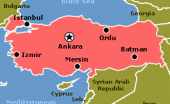Re Ian Bremmer 'Could third-party candidates upend the 2024 US election?' 3 April The current political movement in the USA…
Wednesday Night #1737
Written by Diana Thebaud Nicholson // June 17, 2015 // Wednesday Nights // Comments Off on Wednesday Night #1737
Former Montreal Mayor and Wednesday Night friend Jean Doré died on Monday, June 15. As we read the impressive list of his administration’s accomplishments it seems so fitting that he should have died on the 800th anniversary of the Magna Carta. Much of what the Doré administration introduced is taken for granted today, but pause for a moment to reflect on this list.
The Doré administration launched what was for its day a revolution in public participation, democratic decision-making and openness at the city, not the least of which included unlocking the bronze double front doors of city hall’s main entrance on Notre-Dame St. E., which Drapeau had ordered shut at some point during his reign. …
[Innovations] included the introduction of regulations to protect Mount Royal from unwanted development and an urban plan to guide development in other parts of the city, the creation of consultative committees of city council and a public-consultation office, the introduction of a question period at city council meetings where the public could enter council chambers and ask questions of the mayor and members of council, decentralization of the city into human-scale administrative districts and the opening of local Accès Montréal offices offering municipal services to residents in multiple languages.
Under the Doré administration, the city also invested massively in non-profit housing, opened the Biodôme, installed modern public art, established new regional parks and introduced clauses in municipal contracts to promote political objectives, such as requiring contractors to pledge they have no investments in the nuclear arms industry or in Apartheid in South Africa.
We have wonderful memories of Jean who was always a welcome and enthusiastic participant in Wednesday Nights and mourn his untimely death.
Monday, June 15 was the 800th anniversary of the Magna Carta, widely praised as the foundational document of democracy, guaranteeing fundamental rights and the rule of law. Not so, says Tom Ginsburg , professor of international law and political science at the University of Chicago in his NYT Opinion piece Stop Revering Magna Carta.
“… its fame rests on several myths. First, it wasn’t effective. John repudiated the document immediately, and the barons sought to replace him. John avoided that fate by dying.
The next year, his young son reissued Magna Carta, without some of the clauses. It was reissued several times more in the 13th century — the 1297 version is the one on display in the National Archives and embodied in English law. But the original version hardly constrained the monarch.
A second myth is that it was the first document of its type. But in fact, it was only one of many documents from the period, in England and elsewhere, codifying limitations on government power.
A third myth is that the document was a ringing endorsement of liberty.
In reality, Magna Carta was a result of an intra-elite struggle, in which the nobles were chiefly concerned with their own privileges” [which could also be said about the framers of the U.S. Constitution].
At the ceremony at Runnymede, David Cameron waxed eloquent using the occasion to highlight a future battle – the one to come over his government’s plans to replace the Human Rights Act with a British Bill of Rights. While in the United States, there is a never-ending debate over the application, relevance and interpretation of the American Constitution, especially the Bill of Rights, by the Supreme Court. Lest Canadians become too comfortable as they watch their disputatious southern neighbors, arguments over what is/is not guaranteed by the Charter wind up more and more frequently before the Supreme Court of Canada. A case in point would be Loyola High School and John Zucci v. Attorney General of Quebec wherein the Supreme Court addressed the issue of religious freedom in the context of teaching religion and ethics in a private Catholic school (see Canadian Freedom of Religion Case ). There are those who believe with considerable justification that the Citizenship Act will create two classes of Canadians now that Bill C-24 has been implemented. There will surely be extensive debate over whether Canadian citizenship is a right and no doubt this too will be the subject of a case that will end up in front of the Supreme Court.
But be of good cheer. The Liberals, if elected, are going to fix all that ails Canadian democracy. Justin Trudeau has a (count them) 32-point plan for ‘Restoring Democracy’. It includes saving home mail delivery, reinstating the mandatory long-form census, reopening nine veterans’ service centres that were recently closed, ending the “political harassment” of charities, and un-muzzling government scientists. Not to mention reforming the Senate and changing the electoral system. No mention of open nominations.
The powerful Wednesday Night Greek caucus reminds us that Athens is the cradle of democracy albeit that there have been a few hiccups over the intervening 4000 years. Today, Greece faces an unprecedented crisis with the collapse of talks aimed at preventing a default and possible Grexit. Reuters reports that the European Commission said it would only resume mediation efforts if Greece put forward new proposals, while the Greek government spokesman said Athens was sticking to its rejection of wage and pension cuts and higher taxes on basic goods. Meanwhile, Greek Prime Minister Alexis Tsipras is going to Russia on Thursday (the same day the euro zone finance ministers hold a crucial meeting to review the standoff) to attend an economic forum in Saint Petersburg and meet with President Vladimir Putin. The gravity of the situation is starkly described by Timothy Garton Ash who writes that Greece must be saved for the sake of Europe. One Wednesday Nighter notes “history will record that Greece was right to resist a monoculture of economic austerity imposed by one member (Germany) on the rest of the group (Eurozone) and that Germany was wrong in shirking its leadership role to pursue the next steps of European unification (i.e. fiscal union, pooling of debts, banking union and a form of transfer payments). As painful as the consequences on Greece will be, Greece will end up being on the ‘right side’ of History.” However, as the politicians and bankers posture and editorial writers figuratively wring their hands, the real Greek tragedy is reflected in this headline from the LA Times, With jobless rate above 50%, disillusioned Greek youths becoming a ‘lost generation’.
Perhaps the world should impose arbitration by the only seemingly fearless world leader – the Pope – who has now waded into the politics of the environment. We must wait until Thursday for the final text of his encyclical, however, we know that “In words likely to anger some of his conservative critics, the pope backs the science of climate change, saying ‘plenty of scientific studies point out that the last decades of global warming have been mostly caused by the great concentration of greenhouse gases (carbon dioxide, methane, nitrogen oxide and others) especially generated by human action’. Pope Francis blasts global warming deniers in leaked draft of encyclical Maybe this explains Stephen Harper’s nano-visit with His Holiness last week? Can’t wait to see how the Republicans and Conservatives will manage their reactions, as many will be leery of criticizing this Pope. Not that longtime climate change skeptic Sen. James Inhofe (R-Okla.) and his ilk will be deterred [Jim Inhofe Says The Pope Shouldn’t Talk About Climate Change]
Which brings us to the Untied (sic) States and the trade agreement debate. President Obama suffered what all agree was a major setback last week when Congress denied him the requested fast-track authority. Setting aside the effective lobbying by the AFL-CIO, for once, there appearsto be genuine concerns among legislators about both the TPP and the trade deal with the EU. Even the usually supportive Mark Shields commented on PBS Newshour that “There are no enforcement provisions in the trade agreement for workers’ rights. You’re competing now with workers in Vietnam, who are making 56 cents an hour. That is a disadvantage to Americans. There is no enforcement for environmental standards and there’s certainly no enforcement, nor even mechanism, as far as currency manipulation, which the Japanese and the Chinese have used to benefit in trade by driving down the price of their own goods, to the disadvantage of our country, as well as our workers.” And according to Deutsche Welle, “There has been staunch opposition in the EU to a transatlantic trade deal. … Opposition to the Trans Pacific Partnership has focused on concerns that a deal with lower wage countries could lead to a further outsourcing of jobs to Asia. But tensions are also simmering below the surface over the potential deal with the European Union, the Transatlantic Trade and Investment Partnership (TTIP). Critics, such as Jean Halloran with the Consumers Union advocacy group, have slammed the secrecy shrouding the negotiations.” Seeking clarification, we turned to one of our favorite sources of thoughtful opinion and landed on Professor Dani Rodrik’s The Muddled Case for Trade Agreements . Professor Rodrik’s tightly argued piece is not reassuring to those of us who are not sure what to think. He concludes: “In the end, there is much uncertainty about these trade agreements’ economic and political consequences, and considerable room for concern. Proponents only discredit themselves by deriding the skeptics as protectionists. Open, informed debate about specific provisions is exactly what is called for. And that is possible only if the negotiating texts are opened to public scrutiny.” But is that likely to happen? And if not, then what?



